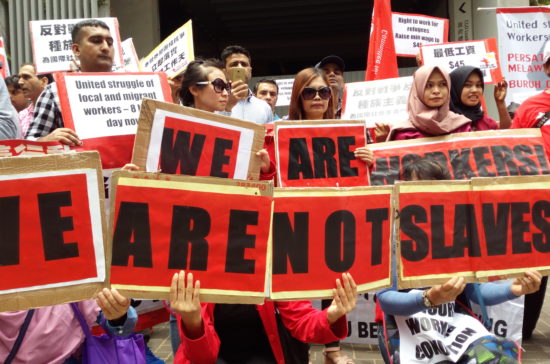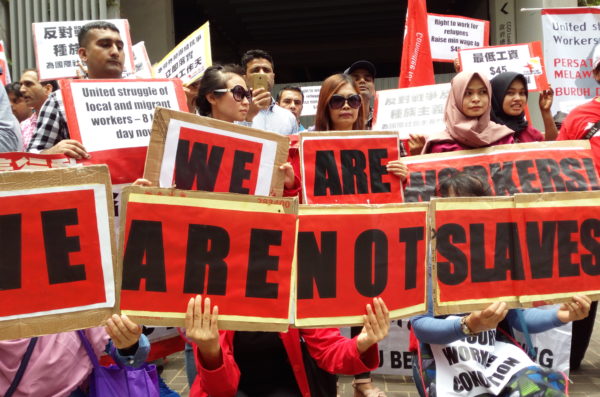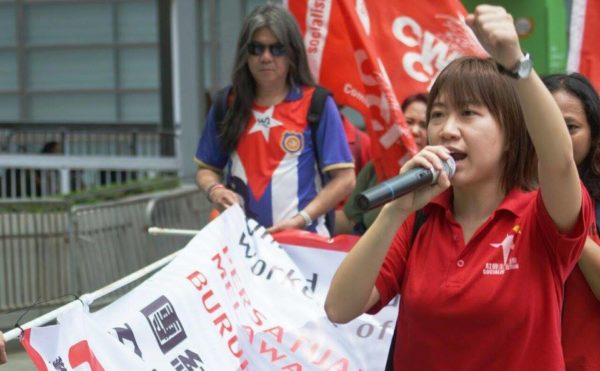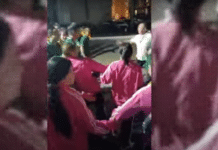
Forced to sleep in kitchens, basements, cupboards and toilets – new survey shows
Vincent Kolo, Socialist Action (CWI in Hong Kong)
43 percent of Hong Kong’s migrant domestic workers do not have their own room according to a survey of more than 3,000 migrants by the Mission For Migrant Workers (MFMW), an NGO. Hong Kong employs over 340,000 migrant domestic workers mainly from Indonesia and the Philippines.
The survey revealed that some domestic workers are forced to sleep in storage rooms, kitchens, toilets, basements, closets and even on balconies and rooftops. The report also shows:
- One in 10 domestic workers are not provided with bedding as stipulated in the standard job contract.
- Of the 57 percent of domestic workers with their own room, one-third said this space was also used as a storage area, for laundry, or for keeping pets.
“The cause of this suffering is the government’s live-in rule which we have long campaigned against,” said Sally Tang Mei-ching of Socialist Action. “Along with migrant activist groups in Hong Kong we call for the right to live-out so that domestic workers can find their own solutions instead of being forced to suffer the conditions highlighted in this report,” she said.
Ilalang Victoria of Kobumi (Komunitas Buruh Migran – Migrant Workers’ Community) also strongly criticised the live-in rule. “These are really inhuman conditions but it is not a new problem. For example if a domestic worker sleeps in the living room, they will often not sleep. Many Hong Kong people go to sleep very late and so the domestic worker cannot sleep until the others have gone to bed. It is also very bad for their health if the employer makes the domestic worker sleep in the toilet, or near the toilet,” she said.

Segregation and social control
The right of migrant domestic workers to live-out was abolished by the Hong Kong government in 2003, except for those who have been in continual employment with the same employer since before this time. The Immigration Department conducts periodic raids on domestic workers suspected of not living with their employer. The penalty is up to fourteen years in prison and a maximum fine of HK$150,000, while for employers the punishment is a ban on employing domestic workers in future.
“The purpose of this law is segregation and social control,” says Sally Tang Mei-ching. “It is to prevent migrant domestic workers gaining greater control over their work hours, their free time, and living a life that is not completely dependent on the wishes of the employer. This leads to abuses as the report shows, and other abuses like 16-hour work days and even physical violence,” she said.
Hong Kong has the most cramped living conditions in the world. The average flat size is 470 square feet (43 square meters) according to the South China Morning Post, which is half the average size of flats in American cities such as New York.
This also explains why domestic workers are squeezed into kitchens and storage rooms – many households are unable to fulfil the “suitable accommodation” requirement contained in every employment contract for migrant domestic workers. The government is fully aware of this predicament but still insists on the live-in rule.
Checks on domestic workers’ accommodation and working conditions by government departments are non-existent, while the hiring agencies, which act as middlemen between domestic workers and employers, are part of the problem rather than part of the solution. These agencies engage in widespread illegal practices including overcharging migrant workers for their ‘services’.
Law-breaking agencies
The Indonesian government and the Philippines to a lesser extent force their citizens to go through an agency to seek employment in Hong Kong. A separate recent study by University of Hong Kong students found that more than 70 percent of recruitment agencies in Hong Kong are charging excessive fees – the legal limit is HK$431 but charges of HK$15,000 to HK$20,000 are not uncommon.
The study also confirmed the long held complaints of migrant workers that the agencies illegally withhold passports and other personal documents – sometimes even ATM cards – to coerce migrant workers to pay debts that the agencies force upon them.
There is enormous economic pressure on less affluent families in Hong Kong who need a domestic worker to look after children or an elderly parent but live in small apartments with no possibility to offer a separate room to a domestic worker. Hong Kong suffers from a chronic shortage of affordable public childcare and elderly care as a result of government policies. On average over 5,000 elderly people die every year waiting to be placed in a care home and the Social Welfare Department has been accused of manipulating its data to understate the average waiting time for care home places which it says is three years.
The unelected Hong Kong government siphons public money into costly infrastructure projects to enrich the tycoon property companies rather than invest in badly needed public services. It fills the gap by importing cheap labour from other Asian countries under conditions that Amnesty International described as “modern-day slavery”.
Socialist Action demands:
- Abolish the live-in rule!
- Abolish the bloodsucking agencies and replace them with a statutory non-profit publicly run hiring and monitoring agency with democratic input from migrants themselves.
- Increase the monthly minimum wage for migrant domestic workers immediately to HK$5,000 from HK$ 4,310 – fight for the statutory minimum wage (currently HK$ 34.50 per hour) to apply to all workers including migrants and workers with disabilities.
- Big increase in government expenditure on cash-starved public services such as childcare, elderly care and social services – Tax the super rich and scrap the extravagant white elephant projects!
- Migrant workers need a strong union and united struggle side-by-side with local workers against the anti-working class policies of the pro-billionaire Hong Kong government and governments in migrants’ home countries.




